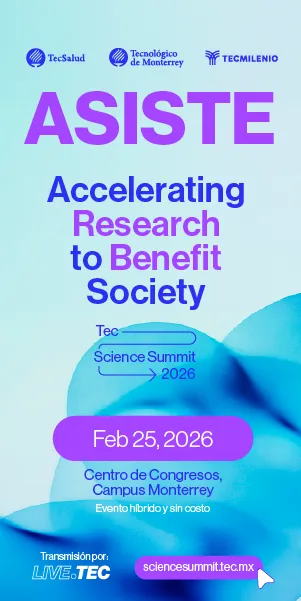How a child is fed in the earliest years of life can shape not only their future health but also the social and economic development of entire countries. According to Rafael Pérez-Escamilla, professor at the Yale School of Public Health, early nutrition and breastfeeding are among the most effective tools to reduce disease, inequality, and long-term social gaps.
“Early nutrition is the most cost-effective investment any country can make,” he said. Food and nutrition security, he explained, makes it possible to sustain the rapid pace of human growth required for healthy development—especially during the first 1,000 days of life, a critical window for cognitive, brain, and psychosocial development.
These insights were shared during the International Early Childhood Forum, organized by the Tec de Monterrey Early Childhood Center and Fundación FEMSA, where Pérez-Escamilla presented his talk, Early Nutrition as a Key to Zero Hunger, Planetary Health, and Social Peace, drawing on recent scientific evidence about the far-reaching impact of nutrition in early childhood.
The Benefits of Breastfeeding Keep Growing
Breastfeeding is the optimal source of nutrition for infants: it supports brain development, promotes healthy growth, and strengthens the immune system. Recent research shows that “the list of benefits of breast milk continues to grow: in addition to preventing respiratory, ear, and gastrointestinal infections, it prevents cerebrovascular and cardiovascular diseases. It also reduces neonatal mortality and the risk of sudden death, and decreases the likelihood of asthma, dental malocclusion, pediatric leukemia, type 1 diabetes, and obesity.”
Infant nutrition changes rapidly during the first two years of life. As the researcher explains: “When a baby is born, exclusive breastfeeding provides all the necessary nutrition for the first six months. From that point on, they should begin healthy and safe complementary feeding, with textures that progress according to their development. By the second year, they should already be eating nutritious and varied foods, like the rest of the family.”
This diversification process occurs alongside the baby’s motor and cognitive development and coincides with a critical window for maternal health. “Breastfeeding does not benefit children alone: the longer a woman breastfeeds, the lower her risk of high blood pressure, type 2 diabetes, heart disease, breast cancer, and ovarian cancer. It also reduces the risk of severe postpartum hemorrhage.”
He also emphasized the enormous economic value of breastfeeding: if global breast milk production were counted, it would exceed 3.5 trillion dollars annually. However, “there is not a single country that includes breastfeeding in its Gross Domestic Product; they only count the production of infant formula.” For this reason, he called for strengthening support programs at all levels.
Cognitive, Economic, and Environmental Impact
Evidence shows that extending breastfeeding not only improves child health but also enhances cognitive development and generates long-term economic benefits. Pérez-Escamilla explains that children who are breastfed for longer reach social, motor, and language milestones earlier and show greater maturation of white matter in the brain, which is essential for cognitive function.
These effects continue into adulthood. A study from the Federal University of Pelotas in Brazil, titled Association Between Breastfeeding and Intelligence, Schooling, and Income at Age 30: A Prospective Birth Cohort Study in Brazil, followed 4,000 people and found that those who were breastfed for longer periods had incomes nearly 30% higher at age 30. “They found a significant relationship between breastfeeding duration and the wages participants earned,” he noted.
Another recent analysis estimates that increasing exclusive breastfeeding to 90% in the first six months would prevent 72,000 deaths due to chronic diseases and more than 10 million cases of type 2 diabetes.
Beyond its impact on health and development, breast milk also provides environmental benefits. The infant formula industry produces tens of millions of tons of CO₂ and consumes billions of liters of water. As the specialist summarizes: “Breastfeeding not only protects health; it also protects the planet.”
Complementary and Responsive Feeding
In his lecture, Pérez-Escamilla highlighted the importance of responsive feeding, an approach that integrates nutrition with emotional care, enabling children to explore food, self-regulate their intake, develop healthy preferences, accept vegetables, and avoid ultra-processed foods.
This approach applies the principles of nurturing and sensitive care during feeding: it is not only about what children should eat, but how the entire process unfolds.
“If we surround babies and young children with healthy food and allow them to participate as equals in decisions about what and how much to eat, we can practice responsive feeding. This means accompanying them with warmth and affection throughout the process.” He also recommends turning mealtimes into opportunities for early stimulation, learning colors, numbers, and shapes, and reminds caregivers to remain patient and in good spirits.
What Should Mexico Strengthen in Early Nutrition?
Pérez-Escamilla acknowledged recent progress in Mexico, such as the updated national responsive feeding guidelines for early childhood care centers. He also stressed the urgency of strengthening community programs, supporting maternal nutrition, and ensuring food security in a context of high poverty.
He concluded by emphasizing that failing to invest in nutrition during the early years has profound consequences: it increases healthcare costs, reduces human capital, weakens economies, and expands the environmental footprint. “Maternal and child nutrition affects all the SDGs, and all of them affect nutrition. There is no alternative.”
















